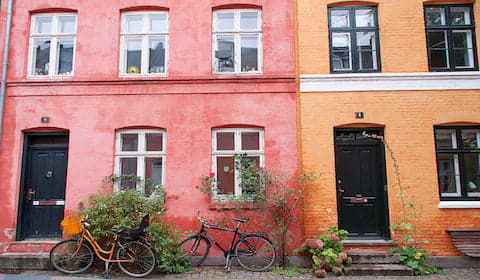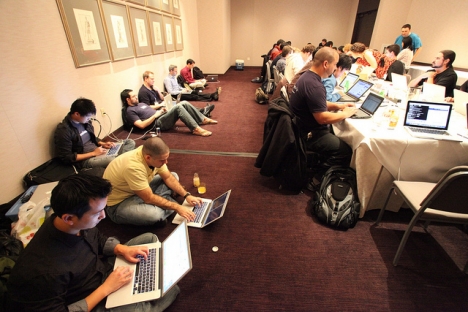Essential tips for renting a home in Copenhagen

It can be incredibly challenging to find a place to live in the Danish capital, particularly at the start of a new school year. The Local spoke with a variety of stakeholders for advice on how to find accommodation in Copenhagen.
If you are trying to get a shared house or an apartment in Denmark's largest cities, you may already know the struggle.
Denmark is a great place to live but finding the right house for you can take a long time, particularly at this time of year when tens of thousands of new university students descend upon Copenhagen and Aarhus in search of an affordable place to live.
To land the right place, you'll need patience and a bit of luck to be chosen among the hordes of students from across Denmark and all around the world. Keep these tips in mind when searching for your dream accommodation.
1. Take a hard look at your budget
Denmark is well know for being a very expensive country, and that extends to the flats in the country's largest cities. If you are a student you´ll probably only need a shared room, but the prices for a room can run between 3,000 and 5,000 kroner, so finding a affordable place can be tricky and disappointing. In central Copenhagen, those prices are even higher.
“The best way to find a new place, is to start having your search criteria in order. You need to know how much you can pay in rent and deposit, and also in which area of the city you want to live. After that, you will need to search after a home on every platform you can find,” Kristian Matthes from Findroommate.dk told The Local.
2. Use your social network
Finding a place to live will require a lot of time and effort. One of the most successful ways of landing that perfect room or flat is to know someone – or know someone who knows someone – who is looking for a roommate. If you are coming from abroad, be sure to post on Facebook that you are moving to Denmark, and join the various Facebook groups for expats living in Danish cities. Be sure to ask that friend who used to live here if they have any advice. The best way to find a place is through your contacts, so put them to work for you.
3. Extend your search beyond the centre of the city
We get it. You want to live in the cool-urban-trendy area and settle down in the inner neighbourhoods of Copenhagen, multicultural Nørrebro or ’yuccie’ Vesterbro. The problem is that so does everyone else and most of the rentals here are already taken. It’s difficult even for the Danes to find housing there.
Ditto Mailund, a journalism student from northern Jutland is having a hard time finding a place in Nørrebro.
“It’s not so much the money, the hard part is finding something because there aren’t many places” Mailund said. “It’s like a competition.”
If you're willing to live outside of the city, you'll have infinitely more options and you'll get much more for your money. And all of those trendy areas will still just be a bike or train ride away.
4. Find a temporary solution
Maybe it isn’t your dream flat, but you might want to seize any opportunity that comes your way. You can always continue to look for another place that suits you better. This can be particularly useful if you’re a foreigner because it will give you the time to explore the different city areas and focus your search.
“Cheap accommodations are already taken, so I’d recommend to extend the search area an rent a temporary place to be, then you can find a more suitable house for you,” Michael Eggert, the director of Lejebolig.dk, told The Local.
5. Make yourself stand out from the crowd
Apparently, we are not quite as creative as we think. When contacting a potential landlord or roommate, just be yourself. That may sound like rudimentary advice, but renters are deluged by prospective residents and you need to distinguish yourself from others.
Julie Dahl, 20, is renting a room of her two-room home in Copenhagen while she goes off to Odense to study medicine. She told The Local that sifting through potential tenants is tiresome.
“Everyone always writes the same stuff, like 'I am reliable, always pay on time, don’t smoke, etc.' Personally, I always try to identify the people that I will get along with, so it is important to try to let your personality show. Are you funny, serious, sociable, creative, etc? That way, I may find the perfect match.”
6. ‘Join forces’
Since it is often more difficult to find a room that an entire apartment, you should consider getting together with some other people in your situation and instead look directly for a flat.
“There are quite a few vacant big apartments in Copenhagen, which are ideal for more people to share. So start to reach out to other house seekers,” Matthes from Findroommate.dk said.
7. Sign a contract
You may be quite desperate but you should never enter an under-the-table agreement and you should always thoroughly read the contract you are given. If you're a foreigner and the contract is in Danish, reach out to friends, classmates and colleagues for help.
Whether dealing with the landlord of your new roommates, be sure of the terms for getting your deposit back and all the expenses beyond the monthly rent. Danish deposits can often cover two or three months' worth of rent so you don't want to find yourself in an unpleasant legal battle.
For even more advice on how to find a place to live in Copenhagen, be sure to check out our feature 'What to know about renting in Copenhagen'.
Comments
See Also
If you are trying to get a shared house or an apartment in Denmark's largest cities, you may already know the struggle.
Denmark is a great place to live but finding the right house for you can take a long time, particularly at this time of year when tens of thousands of new university students descend upon Copenhagen and Aarhus in search of an affordable place to live.
To land the right place, you'll need patience and a bit of luck to be chosen among the hordes of students from across Denmark and all around the world. Keep these tips in mind when searching for your dream accommodation.
1. Take a hard look at your budget
Denmark is well know for being a very expensive country, and that extends to the flats in the country's largest cities. If you are a student you´ll probably only need a shared room, but the prices for a room can run between 3,000 and 5,000 kroner, so finding a affordable place can be tricky and disappointing. In central Copenhagen, those prices are even higher.
“The best way to find a new place, is to start having your search criteria in order. You need to know how much you can pay in rent and deposit, and also in which area of the city you want to live. After that, you will need to search after a home on every platform you can find,” Kristian Matthes from Findroommate.dk told The Local.
2. Use your social network
Finding a place to live will require a lot of time and effort. One of the most successful ways of landing that perfect room or flat is to know someone – or know someone who knows someone – who is looking for a roommate. If you are coming from abroad, be sure to post on Facebook that you are moving to Denmark, and join the various Facebook groups for expats living in Danish cities. Be sure to ask that friend who used to live here if they have any advice. The best way to find a place is through your contacts, so put them to work for you.
3. Extend your search beyond the centre of the city
We get it. You want to live in the cool-urban-trendy area and settle down in the inner neighbourhoods of Copenhagen, multicultural Nørrebro or ’yuccie’ Vesterbro. The problem is that so does everyone else and most of the rentals here are already taken. It’s difficult even for the Danes to find housing there.
Ditto Mailund, a journalism student from northern Jutland is having a hard time finding a place in Nørrebro.
“It’s not so much the money, the hard part is finding something because there aren’t many places” Mailund said. “It’s like a competition.”
If you're willing to live outside of the city, you'll have infinitely more options and you'll get much more for your money. And all of those trendy areas will still just be a bike or train ride away.
4. Find a temporary solution
Maybe it isn’t your dream flat, but you might want to seize any opportunity that comes your way. You can always continue to look for another place that suits you better. This can be particularly useful if you’re a foreigner because it will give you the time to explore the different city areas and focus your search.
“Cheap accommodations are already taken, so I’d recommend to extend the search area an rent a temporary place to be, then you can find a more suitable house for you,” Michael Eggert, the director of Lejebolig.dk, told The Local.
5. Make yourself stand out from the crowd
Apparently, we are not quite as creative as we think. When contacting a potential landlord or roommate, just be yourself. That may sound like rudimentary advice, but renters are deluged by prospective residents and you need to distinguish yourself from others.
Julie Dahl, 20, is renting a room of her two-room home in Copenhagen while she goes off to Odense to study medicine. She told The Local that sifting through potential tenants is tiresome.
“Everyone always writes the same stuff, like 'I am reliable, always pay on time, don’t smoke, etc.' Personally, I always try to identify the people that I will get along with, so it is important to try to let your personality show. Are you funny, serious, sociable, creative, etc? That way, I may find the perfect match.”
6. ‘Join forces’
Since it is often more difficult to find a room that an entire apartment, you should consider getting together with some other people in your situation and instead look directly for a flat.
“There are quite a few vacant big apartments in Copenhagen, which are ideal for more people to share. So start to reach out to other house seekers,” Matthes from Findroommate.dk said.
7. Sign a contract
You may be quite desperate but you should never enter an under-the-table agreement and you should always thoroughly read the contract you are given. If you're a foreigner and the contract is in Danish, reach out to friends, classmates and colleagues for help.
Whether dealing with the landlord of your new roommates, be sure of the terms for getting your deposit back and all the expenses beyond the monthly rent. Danish deposits can often cover two or three months' worth of rent so you don't want to find yourself in an unpleasant legal battle.
For even more advice on how to find a place to live in Copenhagen, be sure to check out our feature 'What to know about renting in Copenhagen'.



Join the conversation in our comments section below. Share your own views and experience and if you have a question or suggestion for our journalists then email us at [email protected].
Please keep comments civil, constructive and on topic – and make sure to read our terms of use before getting involved.
Please log in here to leave a comment.